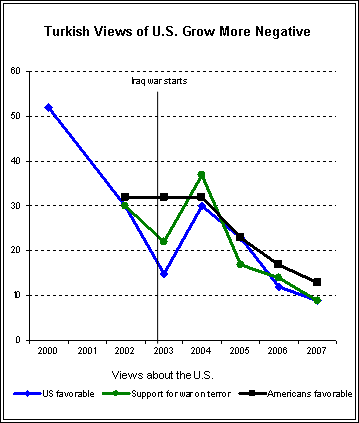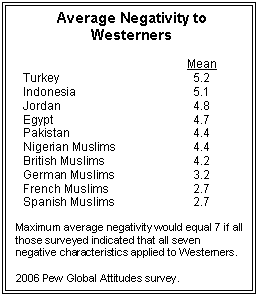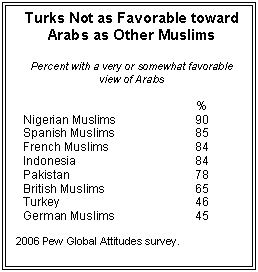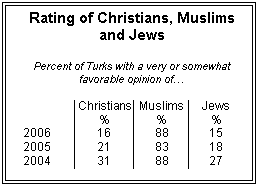by Brian J. Grim, Pew Forum on Religion & Public Life, and Richard Wike, Pew Global Attitudes Project
Earlier this month, Turkey threatened to curtail U.S. military access to Turkish bases and recalled its ambassador from Washington for consultations. These actions came in response to the U.S. House Foreign Affairs Committee’s approval of a resolution asserting that the Turkish massacre of Armenians nearly a century ago constitutes genocide. Compounding these tensions, and despite strong objections from the United States, the Turkish parliament recently authorized its government to conduct military incursions into northern Iraq in order to combat the Kurdistan Workers Party, or PKK, which uses northern Iraq as a staging area for incursions into Turkey.
Turkey is a strategic American ally. It not only serves as a bridge between East and West but also is one of the few Muslim-majority countries to have friendly relations with Israel, so these strong reactions from the Turkish government could be quite ominous. But do these actions reflect some deeper discontent among the Turkish public, or are they simply the Turkish government’s response to current, and perhaps temporary, crises in the international arena?
Views of America

Recent Pew Global Attitudes surveys show that negative views of the United States are indeed widespread and growing in Turkey. In fact, the United States receives a lower favorability rating (9%) in Turkey than in any of the 47 countries in the 2007 Pew Global Attitudes survey. This is down considerably from a 30% favorability rating in Pew’s 2002 poll and from 52% in a 2000 State Department poll. There also has been a correspondingly sharp drop in the favorability rating for the American people (from 32% in 2002 to a mere 13% in 2007).
These negative views are also seen in Turks’ opinions on American foreign policy. For example, just 9% of Turks support the U.S.-led war on terror, and only 14% think the U.S. considers the interests of countries like Turkey when making foreign policy decisions. Moreover, according to a 2006 Pew poll, a large majority (64%) of Turks believe that the efforts to establish a stable democratic government in Iraq will fail. This is the largest percentage in any of the 15 countries surveyed in 2006, including four other predominantly Muslim countries (29% in Jordan expressed this view, 25% in Egypt, 16% in Indonesia and 14% in Pakistan). Not surprisingly, in light of these negative views of the U.S. and American foreign policy, 86% of Turks now favor removing U.S. troops from Iraq, according to the 2007 Pew poll.
View of the EU and the West

Negative views also appear to be growing among Turks with respect to the European Union and to Westerners in general. Such negativity toward the EU is likely associated with disillusionment over Turkey’s stalled bid to join the union. For instance, the favorability rating for the EU dropped from 58% in 2004 to 27% in 2007.
A combination of all these factors seems to be generating more negative views of Westerners generally. Of the 10 Muslim publics surveyed in the 2006 Pew Global Attitudes poll, for instance, the Turkish public showed the most negative views, on average, toward Westerners. The survey asked Muslims whether they associate people in Western countries such as the U.S. and European nations with a series of negative and positive characteristics, including “arrogant,” “greedy,” “immoral,” “selfish,” and “violent,” as well as “generous” and “honest.” The two positive characteristics were reverse coded to reflect the opposite. For this analysis, a negativity index that ranges from zero (extremely positive) to 7 (extremely negative) was created using this series of questions.1
On this scale, the average for Turkey is 5.2, which is a higher level of negativity than is found in the other four Muslim-majority countries surveyed (Egypt, Indonesia, Jordan and Pakistan) as well as among the Muslim populations in Nigeria, Britain, Germany, France and Spain. The fact that German Muslims, who are predominantly of Turkish background, score much lower (3.2) on the index indicates that the negativity toward Westerners is not particular to Turks but rather to Turks in Turkey.

But Turkish discontent extends beyond views of the U.S. and Europe. For example, according to the same 2006 Pew poll, Turks also express lukewarm attitudes toward Arabs. While Muslims among other non-Arab publics overwhelmingly say they have a positive view of Arabs, only 46% of Turks express a positive opinion, among the lowest of the 10 Muslim publics surveyed; only German Muslims (who, as noted above, are predominately of Turkish origin) were less positive toward Arabs. And when asked whether they sympathize more with Israel or the Palestinians, fewer Turks expressed sympathies with Palestinians (64%) than did other countries in the Middle East.
Large and increasing majorities of Turks also hold unfavorable views of Christians and Jews. From 2004 to 2006, favorability toward Christians dropped by 15 percentage points, from 31% to 16%. Likewise, favorability toward Jews dropped 12 points, from 27% to 15%.
Secular-Religious Divide

This increasing negativity toward other countries and groups is taking place as Turkey experiences considerable internal conflicts related to the ongoing tensions between the country’s secular establishment and followers of the ruling, Islamic-oriented Justice and Development Party (known in Turkey as the AKP).
Despite the strong tradition of secularism in Turkey, Islam remains central to the identity of most Turks. Indeed, religious identification is on the rise. Roughly half of Turkish Muslims (51%) surveyed in 2006 say they think of themselves first as Muslim rather than Turkish, while 19% identify primarily with their nationality, and 30% volunteer that they think of themselves as both. This represents a significant change from just one year earlier, when only 43% identified primarily as Muslim.
Although the percentage of Turks saying they have a very or somewhat favorable opinion of Muslims has varied only slightly over time (88% in 2004, 83% in 2005 and 88% in 2006), the number of Turks saying that they are very favorable toward Muslims has increased from 66% in 2004 to 74% in 2006.
The result of these trends is that Turkey today is increasingly more religious. And, unlike in the days of Turkey’s founder and first president Mustafa Kemal Ataturk, it is less inclined to look to the West for its solutions. In light of Turkey’s many discontents, it is perhaps not surprising that U.S. relations with this key ally are proving increasingly complicated.
Additional Materials
Analysis: Widespread Negativity: Muslims Distrust Westerners More than Vice Versa
Report: An Uncertain Road: Muslims and the Future of Europe
Event: Does “Muslim” Turkey Belong in “Christian” Europe?
1 The seven questions used in the negativity index are part of a larger group of questions in which Muslim respondents were read lists of positive and negative traits and, for each one, were asked whether they associated it with Westerners. The questions regarding generosity and honesty, which originally were stated positively, were recoded to indicate the extent to which these positive traits were not associated with Westerners. For more information on the index, see Richard Wike and Brian J. Grim (2007). “Levels of Negativity: How Muslim and Western Publics See One Another.” Public Opinion Pros October: Article 1.
Photo credit:Tolga Bozoglu/Corbis


